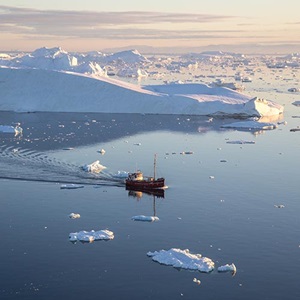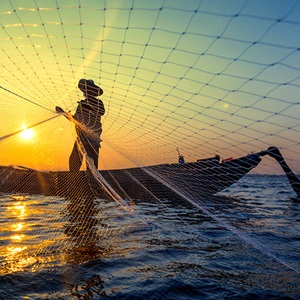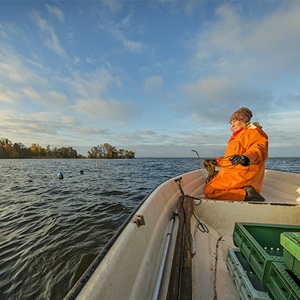Climate change is undermining efforts to fish sustainably. The MSC is carrying out research to identify fisheries and regions where predicted climate impacts threaten their ability to meet MSC benchmarks for sustainable management. The project aims to:
- Analyse more than 500 MSC certified and suspended fisheries worldwide to identify governance vulnerabilities to climate change.
- Ensure climate-resilient fisheries management measures are incentivised through the MSC certification program.
Funded by:
MSC Ocean Stewardship Fund
Start date
1 October, 2022
Key partners
Common Oceans Tuna Project of the Food and Agriculture Organization of the United Nations (UN FAO)
The research challenge
Fisheries face growing challenges to operate sustainably as our climate becomes more variable and extreme. Changes in water temperatures and seasonality are increasingly disrupting ecosystems, altering the distribution of fish stocks and impacting the growth, development and survival of many marine species.
These changes highlight weaknesses in existing management measures and monitoring systems. The inability to adapt and respond to climate change can increase the risk of overfishing, biodiversity loss, and conflict between fishing nations.
Once conflicts or mismanagement concerns emerge, it can be difficult, costly and slow for fishery managers and other stakeholders to agree on and implement solutions. This can lead to fisheries no longer meeting the sustainability requirements of the MSC Fisheries Standard.
The solution
To ensure fisheries become more resilient to climate change we need to understand where issues are likely to arise and the severity of their respective impacts. We also need to incentivise adoption of best practice management measures.
To achieve this, the MSC is carrying out the ‘Assessment of Risks posed by Climate Change’ project (ARC), led by MSC Principal Scientist Dr Katie Longo, with key support from spatial and climate change analyst Lauren Koerner.
The project, which is supported by the MSC’s Ocean Stewardship Fund and the FAO Common Oceans Tuna Project, is assessing fisheries' level of exposure and sensitivity to threats, and the degree of resilience afforded by the governance capacity.
In the first phase, the project has focused on the threats posed by the shifting distribution of fish stocks across management boundaries as well as the capacity of fishery governance systems to deal with change.
In its second phase, the project will consider additional climate-driven impacts and will use these results to evaluate vulnerabilities in the sustainable seafood trade.
A third phase will identify whether MSC certified fisheries are better able to respond to various climate change consequences. Research will look at climate-resilient governance measures present in the MSC Fisheries Standard. It may also identify strengths and weaknesses in certified fisheries and help them accelerate progress toward climate-resilient management systems.
Research paper and findings so far
In 2025, Cell Reports Sustainability published the paper Climate change risks to future sustainable fishing using global seafood ecolabel data led by MSC researcher Lauren Koerner).
The researchers evaluated the risk of disruption to sustainable management of over 500 fisheries by mid-century (2050) under a high emissions climate change scenario.
The researchers found that:
- Fisheries targeting highly migratory tunas and billfishes (swordfish, sailfish and marlin) face the highest risks of management disruption from climate change.
- The next most at-risk fisheries are those targeting small pelagic species like mackerel, herring, capelin and blue whiting, followed by fisheries targeting whitefish like cod, haddock, plaice, sole and monkfish.
- Fisheries targeting species such as krill, shrimp and crab face lower risk from stocks shifting across national boundaries. They may face greater risks from more localised impacts which were not considered in the study, such as from exposure to marine heatwaves and ocean acidification.
Fisheries governance must evolve urgently to be climate resilient. Fishers, Regional Fisheries Management Organisations, and policymakers must coordinate regionally and globally to future-proof these high-value fisheries.
Without greater international collaboration to reduce greenhouse gas emissions these negative impacts will likely increase.
In the North East Atlantic, where governments have not agreed quotas to prevent overfishing, mackerel and herring fisheries lost their MSC certification. Other stocks could soon be at risk without greater action from governments.
Research partners and collaborations
The MSC is working with key partners to build on their existing studies of global climate change threats, including Palacios-Abrantes et al., (2022) and Tittensor et al., (2021).
The project has benefited from support provided by the Common Oceans Tuna Fisheries Project, which is funded by the Global Environmental Facility (GEF) and implemented by FAO.
The MSC co-hosted a session on “Managing fisheries in a world of shifting stocks, integrating biological, policy, behavioural, social and economic aspects” at the World Fisheries Congress in 2024.

Climate change research
The MSC is committed to research into the impacts of climate change on sustainable fishing.

The Ocean Stewardship Fund
The Ocean Stewardship Fund provides grants for fishery improvements and funds important research into bycatch reduction and protecting marine habitats.

Science and research
Our science and research collaborations help ensure our Standard development reflects the latest scientific understanding.
